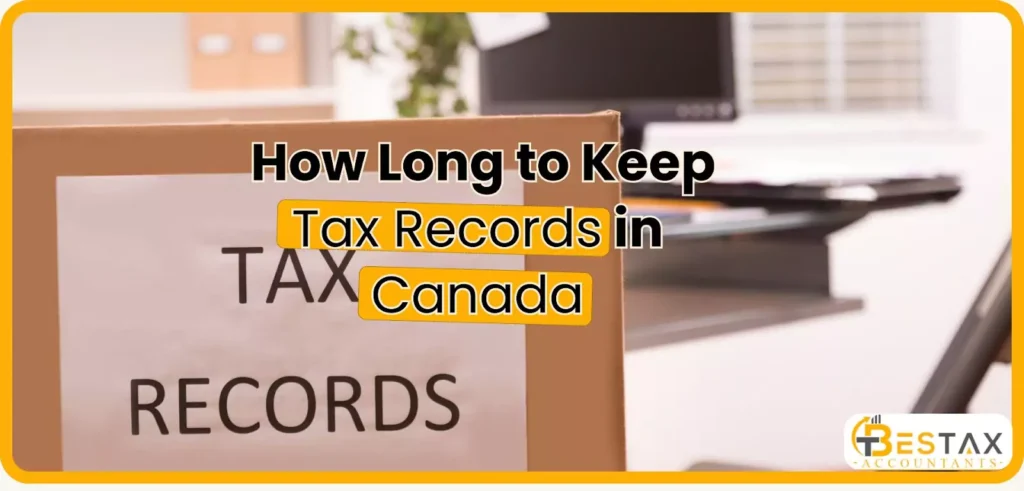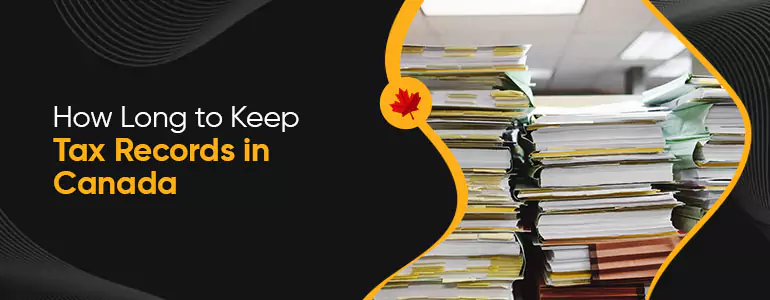Filing your taxes in Canada means dealing with a lot of paperwork. After your return is filed, a big question comes up: how long do I need to keep my tax documents?
In this blog, we’ll walk you through CRA record keeping requirements, how many years you must keep tax receipts in Canada, and what happens if you file late or get audited. Whether you are a business owner or filing personal taxes, understanding tax record retention in Canada will save you trouble later.
Why Do You Need to Keep Tax Records?
The Canada Revenue Agency (CRA) can ask to see your records even after you file. They do this to check if everything was reported correctly. If they audit you or ask for proof, you’ll need your income tax records and supporting documents.
If you can’t show proof, CRA might deny your claims or charge penalties. Keeping records is important for both personal tax record retention and business tax record retention.

CRA’s 6-Year Rule for Tax Record Retention
The CRA’s main rule is clear: keep all tax records for six years from the end of the tax year they relate to. This is known as the six‑year retention rule.
For example:
- If you filed your 2024 taxes in April 2025
- Your six years start from the end of 2024
- You must keep your taxation receipts and documents until the end of 2030
This applies to both corporate and personal tax record retention.
Which Tax Documents Should You Keep?
Here are common documents you should save:
- T4 slips (employment income)
- T5 slips (investment income)
- RRSP contribution slips
- T2202 (tuition receipts)
- Medical expense records
- Donation receipts
- Child care expense records
- Rental income records
- Self-employment invoices
- Bank statements
- Tax returns and notices of assessment
CRA calls these supporting documents. You need them to back up anything you claim.
Where Should You Store Your Tax Records?
You must store your books and records at your home or business in Canada. CRA won’t allow you to keep records outside Canada unless they give you written permission.
If records are kept on a server outside Canada but are accessed in Canada, they are not considered to be in Canada.
CRA may allow digital records if:
- They’re exact copies
- You can show them in CRA-readable format
- They show enough detail to support your return
See Information Circular IC05-1 for more on electronic vs paper records.
What If You File Your Taxes Late?
If you file your return late, the six-year rule starts from the date you filed, not the tax year end. So, if you file your 2021 return in 2024, keep those records until 2030.
This is very important for late-filed tax returns. Filing taxes after the deadline as soon as possible can help reduce penalties and interest charges.
How Long to Keep Records If You’re Audited by CRA
If CRA starts an audit or you file an objection or appeal, keep your records until the latest of:
- The audit or appeal is resolved
- The time for appeal has passed
- The six-year period has ended
These are known as record retention exceptions.
You may need your tax documents longer if you’re under review. Also, missing records can cause CRA penalties.
Can You Destroy Tax Records Before 6 Years?
If you want to destroy your records before the six years are up, you must ask CRA first.
Use Form T137 (Request for Destruction of Records). You can also apply in writing to your tax office.
If you destroy records early without permission, CRA may prosecute.
CRA only controls record rules under federal tax laws. You must follow other laws (provincial, corporate, etc.) for different records.
Which Records Should Be Kept Longer Than 6 Years?
Some records must be kept longer than six years or even indefinitely. These include:
- Capital asset records
- Adjusted cost base calculations
- Property purchase and sale details
- Business incorporation records
- Permanent corporate documents like shareholder registers and meeting minutes
- General ledger retention for businesses
- Estate records (if you are the legal representative of a deceased person)
If CRA tells you in writing to keep records longer, follow their instructions.
CRA Record-Keeping Rules for Businesses
Corporate tax records must be kept for at least six years. But some documents must be saved longer, especially during:
- Amalgamations or mergers
- Dissolutions
- Wind-ups
If a corporation ends, it must keep records for two years after dissolution.
Businesses involved in non-resident transactions or Part XIII withholding tax should also follow special CRA books and records requirements.
How Long Should Charities Keep Donation Receipts?
Registered charities must:
- Keep donation receipt duplicates for two years
- Keep all financial and operational records for six years or longer, depending on the situation
- Follow special rules if their registration is revoked
How Long Should You Keep GST/HST and Other Tax Records?
If you issue a GST/HST tax adjustment note, you must keep it for six years. Even if you haven’t filed a GST/HST return, you’re still required to file it and keep all related records.
Records related to:
- Employment Insurance (EI)
- Canada Pension Plan (CPP)
- Excise Tax and Duty
- Air Travellers Security Charges
also follow similar CRA record retention policy.
Paper vs Digital Tax Records: What Does CRA Accept?
You can keep tax records as either paper or digital files. CRA accepts both, as long as digital records:
- Are readable
- Show full details
- Can be provided on request
Make sure to back up your long-term financial document storage if it’s digital. Losing records due to a hard drive crash won’t excuse you from CRA requirements.
Need Help Organizing Your Tax Records?
Keeping tax records can be confusing and time-consuming, especially if you’re running a business or dealing with complex returns. That’s where a trusted accountant can help.
At Bestax, our experienced team of accountants and bookkeepers understands all CRA record-keeping requirements and tax record retention rules in Canada.
Bestax offers:
- Personal and business tax preparation
- Full-service bookkeeping
- CRA audit support
- GST/HST filings
- Digital and cloud-based record storage solutions
- Help with late-filed returns and objections
Let us take the stress out of managing your taxes. We’ll make sure your income tax records and supporting documents are accurate, complete, and CRA-compliant.
Learn more about our services at Bestax
Quick FAQs
How long must I keep my tax records in Canada?
You must keep tax records for six years from the end of the tax year. Longer if the CRA tells you.
Do I need to keep tax receipts and documents for six years?
Yes, whether you file electronically or on paper. CRA may ask to see your supporting documents at any time within that period.
Does record retention period change if I file late?
Yes. If you file late, the six years start from the filing date, not the tax year end.
When can I destroy tax documents using CRA Form T137?
You can destroy them early only if CRA approves your request through Form T137.
What records do corporations need to keep beyond six years?
Corporations must retain shareholder registers, meeting minutes, and capital asset records beyond six years, sometimes indefinitely.
Should I keep documents related to capital property indefinitely?
Yes, keep records related to capital property until you sell or dispose of it, plus six more years.
What are the record-keeping rules during a CRA audit?
Keep all related records until the audit or appeal process ends, and six years have passed, whichever is longer.
What’s included in “books and records” under CRA rules?
This includes all income, expense, asset, and tax-related documents that support your filings.
Can missing tax records cause CRA penalties?
Yes. If you can’t prove your claims, you may owe more tax, plus penalties and interest.
Disclaimer: The information provided in this blog is for general informational purposes only. It is not legal advice and should not be relied on as such.




